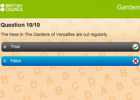Cargando...
Recursos educativos
-
Nivel educativo
-
Competencias
-
Tipología
-
Idioma
-
Tipo de medio
-
Tipo de actividad
-
Destinatarios
-
Tipo de audiencia
-
Creador
Lo más buscado
- Acudits infantils
- Arte español
- Ejemplos de descripción literaria
- Juegos interactivos para niños
- Repaso de lengua castellana para bachillerato de modalidad
- Palabras con z
- Cultivos transgénicos
- actividades para primaria
- Lengua Castellana y Literatura
- Carga eléctrica para bachillerato de modalidad
- Arte español para primero
- Alimentación saludable en P4
- Múltiplos de 7
- Comunicación animal
- Actividades de repaso en primero
-

Observe. The origin and spread of agriculture
EduBook Organización
- 3814 visitas
Look at the map and do the activities: Identify the different agricultural centres and the crops cultivated in each one. When and where did the Neolithic Age spread into Europe?
-

Gardening: the Beginnings
British Council Organización
- 1661 visitas
We can read and listen to this article which is about the origins of gardening, which date back from the Neolithic. next, we can do a questionnaire to check our comprehension.
-

Final self-evaluation 07 - Prehistory
EduBook Organización
- 1537 visitas
Indicate whether the following activities only took place in the Palaeolithic period, in the Neolithic period, or in both periods: making clothes ➝ making pottery containers ➝ growing cereals ➝…
-

Prehistory
EduBook Organización
- 12728 visitas
Prehistory is the period that lasts from the origin of the human species until the appearance of writing (3500 BC). During the Palaeolithic Age, humans were nomads and lived from hunting and gathering.…
-

The first civilizations: Mesopotamia and Egypt
EduBook Organización
- 10893 visitas
Some 6000 years ago in the Middle East, some Neolithic villages became cities as a result of agricultural and commercial prosperity. This led to the first big urban civilisations. These civilisations…
-

Introduction - Prehistory
EduBook Organización
- 8297 visitas
Prehistory is the period that lasts from the origin of the human species until the appearance of writing (3500 BC). During the Palaeolithic Age, humans were nomads and lived from hunting and gathering.…
-

Self-evaluation 1 - Prehistory
EduBook Organización
- 1 lo usan
- 7144 visitas
Complete the text with the missing words: The historical period before the introduction of writing into human society is known as ; it is divided into three ages: the Age, the Neolithic Age and the Age.…
-

Introduction - The first civilizations: Mesopotamia and Egypt
EduBook Organización
- 7038 visitas
Some 6000 years ago in the Middle East, some Neolithic villages became cities as a result of agricultural and commercial prosperity. This led to the first big urban civilisations. These civilisations…
-

End-of-unit evaluation - Prehistory
EduBook Organización
- 1 lo usan
- 6723 visitas
Prehistory is the period that lasts from the origin of the human species until the appearance of writing (3500 BC). During the Palaeolithic Age, humans were nomads and lived from hunting and gathering.…
-

End-of-unit evaluation - The first civilizations: Mesopotamia and Egypt
EduBook Organización
- 6885 visitas
Some 6000 years ago in the Middle East, some Neolithic villages became cities as a result of agricultural and commercial prosperity. This led to the first big urban civilisations. These civilisations…
Te estamos redirigiendo a la ficha del libro...












